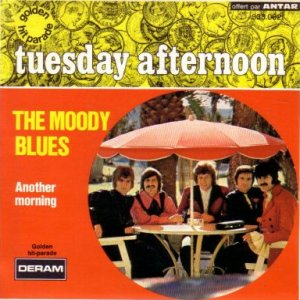Another Morning (The Moody Blues song)
- Another Morning (The Moody Blues song)
Infobox Single
Name = Another Morning

Artist = The Moody Blues
from Album = Days of Future Passed
Released = 20 July 1968
A-side = "Tuesday Afternoon"
Recorded = October 1967
Length = 3:56
Label = Deram
Writer = Ray Thomas
Producer = Tony Clarke
Last single =
This single =
Next single =
Misc =Extra tracklisting
Album = Days of Future Passed
Type = studio
Tracks = ;Side one
#"The Day Begins"
#Dawn: "Dawn is a Feeling"
#The Morning: "Another Morning"
#Lunch Break: "Peak Hour";Side two
#
- The Afternoon: "Forever Afternoon (Tuesday?)" / "(Evening) Time to Get Away"
#Evening: "The Sunset" / "Twilight Time"
#The Night: "Nights in White Satin""Another Morning" is a 1967 song by the symphonic rock band The Moody Blues. It was written by the band's flautist Ray Thomas, and was first released on the 1967 album "Days of Future Passed". The album was a concept album chronicling a typical day, with "Another Morning" featured on the third track, which was titled "The Morning." It is one of two songs written by Ray Thomas for "Days of Future Passed", with the other being "Twilight Time."
"Another Morning" was one of the first songs by the Moody Blues written by Ray Thomas. Thomas would later go on to write some highly successful songs for the Moody Blues, such as "Legend of a Mind" (from "In Search of the Lost Chord"), "For My Lady" (from "Seventh Sojourn"), and "Veteran Cosmic Rocker" (from "Long Distance Voyager").
"Another Morning" was later released in 1968 on the B-side of the "Tuesday Afternoon" single.
Personnel
* Justin Hayward: acoustic guitar
* John Lodge: bass guitar
* Mike Pinder: mellotron
* Ray Thomas: vocals, flute
* Graeme Edge: drums, percussion
* Peter Knight and the London Festival Orchestra: orchestral arrangements
Wikimedia Foundation.
2010.
Look at other dictionaries:
The Sunset (The Moody Blues song) — Infobox Song Name = The Sunset Artist = The Moody Blues Album = Days of Future Passed Released = 10 November 1967 track no = 6 Recorded = October 1967 Genre = Symphonic rock Length = 3:35 Writer = Mike Pinder Label = Deram Records Producer = Tony … Wikipedia
Peak Hour (The Moody Blues song) — Infobox Song Name = Peak Hour Artist = The Moody Blues Album = Days of Future Passed Released = 10 November 1967 track no = 4 Recorded = October 1967 Genre = Symphonic rock Length = 5:33 Writer = John Lodge Label = Deram Records Producer = Tony… … Wikipedia
Twilight Time (The Moody Blues song) — Infobox Song Name = Twilight Time Artist = The Moody Blues Album = Days of Future Passed Released = 10 November 1967 track no = 6 Recorded = October 1967 Genre = Symphonic rock Length = 3:04 Writer = Ray Thomas Label = Deram Records Producer =… … Wikipedia
Floating (The Moody Blues song) — Infobox Song Name = Floating Artist = The Moody Blues Album = To Our Children s Children s Children Released = 15 November 1969 Recorded = May September 1969 B side = Recorded = Length = 3:01 Label = Threshold Records Writer = Ray Thomas Producer … Wikipedia
The Moody Blues — in concert at the Chumash Casino Resort in Santa Ynez, California in 2005. L R: Justin Hayward, Graeme Edge and John Lodge. Background information Origin … Wikipedia
The History of Rock & Roll — was a radio documentary on rock and roll music, originally syndicated in 1969. One of the most lengthiest documentaries of any medium (48 hours in the 1969 version, 52 hours for the 1978 and 1981 versions) Fact|date=January 2008, The History of… … Wikipedia
The Masters Apprentices — Origin Adelaide, South Australia, Australia Genres R B, pop/rock, psychedelic/progressive Years active 1965–1972, 1987–1991, 1994–1995, 1997, 2001–2002 … Wikipedia
The Beetles — The Beatles Gründung 1960 Auflösung 1970 Genre Rock, Pop, Beat Letzte Besetzung vor der Auflösung … Deutsch Wikipedia
The Silver Beatles — The Beatles Gründung 1960 Auflösung 1970 Genre Rock, Pop, Beat Letzte Besetzung vor der Auflösung … Deutsch Wikipedia
The Rock and Roll Hall of Fame's 500 Songs that Shaped Rock and Roll — is an unordered list of 500 songs, created by the Rock and Roll Hall of Fame, that they believe have been most influential in shaping the course of rock and roll, though some of them belong to different styles even after the consolidation of rock … Wikipedia

